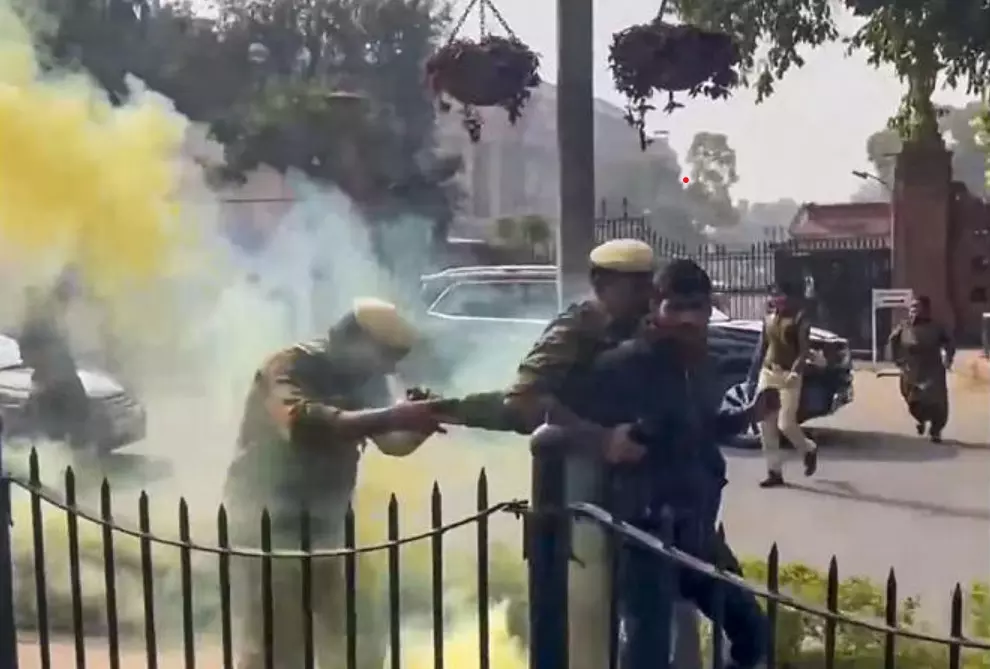A threatening lapse

In a shocking turn of events during the Zero Hour in the Lok Sabha, the security of India's new Parliament building was breached by a group of individuals armed with smoke canisters. This incident, coinciding with the anniversary of the 2001 Parliament attack, has laid bare significant security lapses that need urgent attention and rectification. The breach, though not a terrorist act like its notorious predecessor, demands a serious and thorough investigation, highlighting the critical need for stringent security measures to protect the core of India's democratic institution. The intrusion, a result of two separate but interconnected mistakes – one by the Parliament secretariat and the other by the infiltrators – paints a precarious picture. The first lapse lies in the security apparatus of the new parliament building, raising questions about the effectiveness of the measures in place to safeguard such a vital national institution. The second lapse is the blatant breach of security by a group of miscreants who, by their audacious act, have not only exposed the vulnerabilities but also presented an unacceptable risk to the institution. The incident has unintentionally brought attention to the laxity in the process of granting passes, with a BJP MP authorising the entry of the intruders. While the MP's office justifies the issuance of passes as a routine practice, this breach emphasises the urgent need for a strict regulatory framework governing such authorisations. Security checks must be robust, ensuring that those granted access are thoroughly vetted to prevent any compromise in the safety and sanctity of the Parliament. Despite the gravity of the breach, the intruders claimed their motive was a peaceful protest against perceived government atrocities. However, their method of protest – planning and executing a breach into the Parliament – cannot be justified. India, as a democratic nation, offers numerous avenues for citizens to express dissent without resorting to actions that compromise national security. Regardless of their cause, the intruders must be held accountable for their reckless actions, as any breach into the Parliament poses a serious threat to the nation's democratic fabric. In response to this alarming incident, the Parliament has wisely opted for a comprehensive security audit. This move is crucial in identifying and rectifying lapses, ensuring that the vulnerabilities exposed by this breach are swiftly addressed. Members of Parliament have suggested various measures to enhance security, including the introduction of full-body scanners, the installation of glass walls in front of visitor galleries, and the deployment of security personnel in these galleries – mirroring practices from the old building. The suggested security measures indicate a commitment to fortifying the Parliament against potential threats. Full-body scanners would enhance the screening process, while glass walls and increased security personnel would act as deterrents, preventing unauthorised access to sensitive areas. Learning from past experiences and implementing stringent security protocols is essential to safeguarding the heart of India's democracy. As the investigation progresses, it is imperative to mete out stringent punishment to the miscreants responsible for the breach. This sends a clear message that any attempt to compromise the security of the Parliament will be dealt with firmly, deterring potential infiltrators and ensuring the safety of this symbol of democratic governance. Already, at least four people have been arrested and two have been detained. The Delhi Police is learnt to have registered a case under anti-terror law UAPA. To sum up, the recent breach in the Parliament serves as a wake-up call, necessitating a comprehensive overhaul of security protocols and a re-evaluation of the processes governing access to the institution. Strengthening the citadel of democracy is not just a matter of national pride but a fundamental requirement to ensure the continued functioning of India's democratic machinery. As the nation reflects on this incident, it must emerge with a fortified and resilient Parliament, impervious to external threats and symbolising the unwavering strength of Indian democracy.



